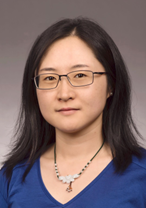 Yaqi You is an Assistant Professor in the Department of Environmental Resources Engineering at the State University of New York College of Environmental Science and Forestry. Her research group studies microbiomes in both natural and engineered system through an interdisciplinary lens, with a long-term goal of harnessing the environmental microbiome for a sustainable food-energy-water nexus. Current research directions of interest include manipulating soil and rhizosphere microbiomes using carbonaceous materials, understanding the impact of emerging contaminants on the spread of antibiotic resistance, and addressing aquatic intermittency effects on stream microbiomes and water quality. She received a PhD in Environmental Engineering from Johns Hopkins University and a postdoctoral fellow in Environmental Health from Johns Hopkins Bloomberg School of Public Health.
Yaqi You is an Assistant Professor in the Department of Environmental Resources Engineering at the State University of New York College of Environmental Science and Forestry. Her research group studies microbiomes in both natural and engineered system through an interdisciplinary lens, with a long-term goal of harnessing the environmental microbiome for a sustainable food-energy-water nexus. Current research directions of interest include manipulating soil and rhizosphere microbiomes using carbonaceous materials, understanding the impact of emerging contaminants on the spread of antibiotic resistance, and addressing aquatic intermittency effects on stream microbiomes and water quality. She received a PhD in Environmental Engineering from Johns Hopkins University and a postdoctoral fellow in Environmental Health from Johns Hopkins Bloomberg School of Public Health.
Read Yaqi’s Emerging Investigator Series article “Emerging investigator series: Differential effects of carbon nanotube and graphene on the tomato rhizosphere microbiome” and read more about her in the interview below:
Your recent Emerging Investigator Series paper focuses on Differential effects of carbon nanotube and graphene on the tomato rhizosphere microbiome. How has your research evolved from your first article to this most recent article?
My first paper was about the persistence of mobile antibiotic resistance genes in agricultural soils due to a process called horizontal gene transfer and the influence of antibiotic residues on that process. Since then, my research has continued to focus on the environmental microbiome but evolved significantly to encompass areas in environmental health, sustainable nanotechnology, biotechnology, and biogeochemistry. What has also expanded over time is my research toolbox. My current group employs systems microbiology, analytical chemistry, and data science to understand responses of microbial systems to environmental changes with an ultimate goal of harnessing microbial powers for sustainable development. This recent article exemplifies the trajectory of that evolution. In this work, we found that carbon nanotubes have a greater impact than graphene on the rhizosphere microbiome and that rhizosphere microbes have unique responses to carbon nanotubes compared to bulk soil microbes. I hope our work can help unveil mechanisms underlying CNM-introduced plant phenotypic changes.
What aspect of your work are you most excited about at the moment?
At the moment, I am very excited about delineating microbial responses to carbonaceous materials, particularly those in the rhizosphere. The rhizosphere microbiome is an essential component of the plant holobiont and significantly contributes to host fitness. Material-based manipulation of the plant rhizosphere holds promise to achieve sustainable crop production.
In your opinion, what are the most important questions to be asked/answered in this field of research?
When studying the rhizosphere, I think important questions include (1) how can we disentangle complex microbe-chemical interactions in response to material-based modulation, and (2) to translate knowledge in this line to the implementation of precision rhizosphere manipulation and even engineering.
What do you find most challenging about your research?
The rhizosphere represents one most complex microenvironment where a tremendous diversity of microbes and molecules coexist. Multi-omics is an ideal tool to understand the dynamic rhizosphere. However, multi-omics integration, a merger of molecular biology, analytical chemistry, bioinformatics, and data science, is always challenging.
In which upcoming conferences or events may our readers meet you?
My group is attending the AEESP (Association of Environmental Engineering and Science Professors) Research & Education Conference in Boston beginning on June 20, 2023. We also plan to attend the ASA (American Society of Agronomy)-CSSA (Crop Science Society of America)-SSSA (Soil Science Society of America) International Annual Meeting in St. Louis starting on October 29, 2023.
How do you spend your spare time?
I enjoy traveling and photographing, watching movies, reading books, playing ukulele, and spending time with friends and family.
Which profession would you choose if you were not a scientist?
My childhood dream was becoming an astronaut and I almost chose an astronomy major as an undergraduate. I was also fascinated with ancient world history and comparative history.
Can you share one piece of career-related advice or wisdom with other early career scientists?
Creating a supportive “network” (credit to Earth Science Women’s Network) is critical and rewarding, both professionally and personally; learning research directions not immediately adjacent to one’s own field can spark new, interdisciplinary ideas.










